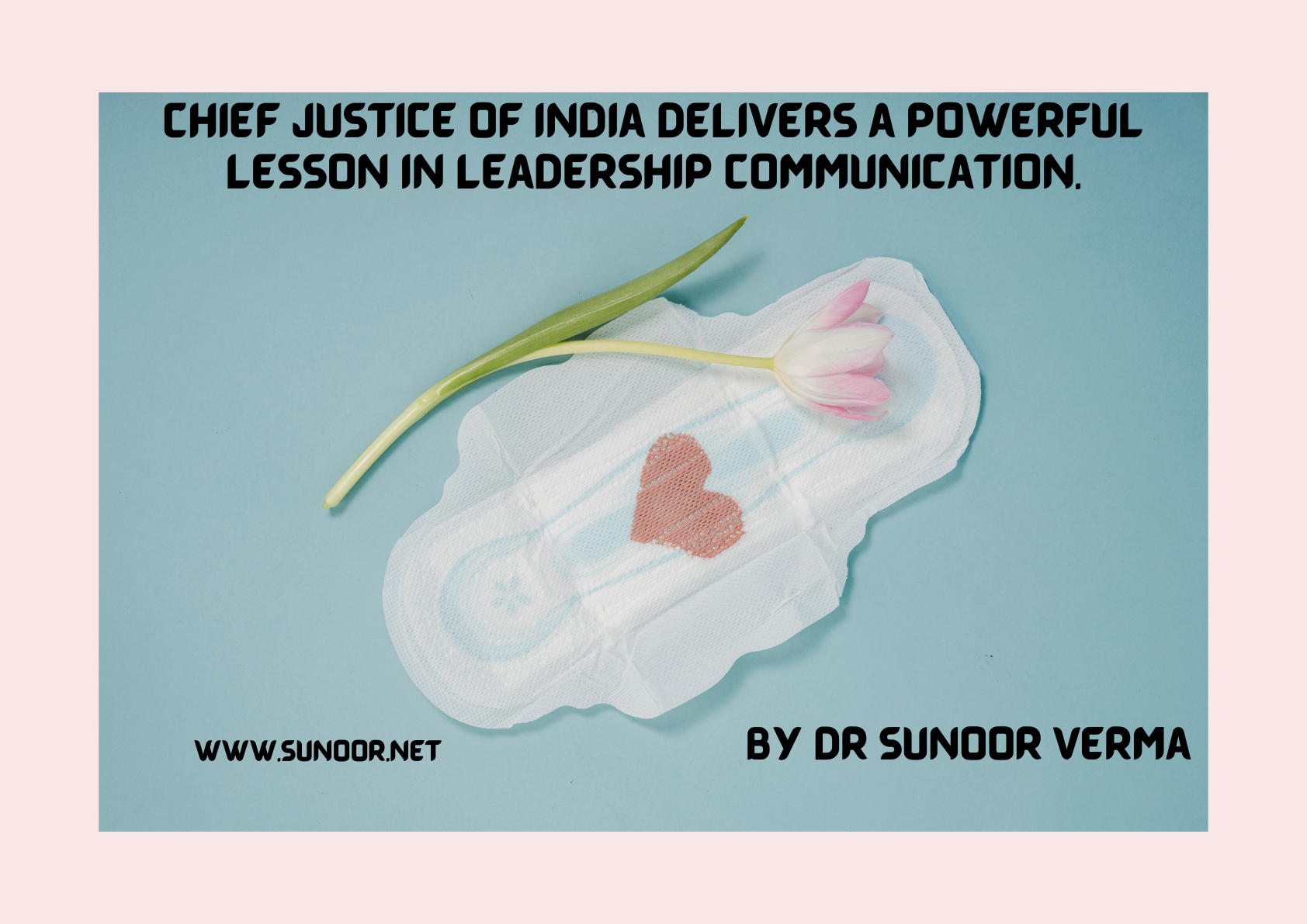Chief Justice of India delivers a powerful lesson in Leadership Communication.

In his remarks at the 31st annual convocation of the National Law School Bangalore, Chief Justice of India DY Chandrachud displayed exceptional #leadershipcommunication qualities. In his remarks, CJI Chandrachud addressed the “taboo” topic of #menstruation and the difficulties that #women #lawyers confront in juggling their careers and personal lives. He also related a personal story about his late former wife being instructed to “find a husband who can manage household chores” when she inquired about working hours at a legal company.
In sharing this story, CJI Chandrachud was willing to discuss complex topics and challenge the status quo. He also showed that he is aware of women lawyers’ challenges and is committed to creating a more inclusive and supportive workplace for them.
In the best-case scenario, male leaders address women’s issues on International Women’s Day or when requested to speak at a women-focused event. What lifted Dr Chandrachud’s speech to a leadership speech was that he mainstreamed women and their issues in a convocation speech. This sends a strong message to other leaders that women’s issues must take centre stage in New India.
Here are some of the exemplary leadership communication traits that CJI Chandrachud demonstrated in his speech:
- He was authentic and transparent. CJI Chandrachud did not shy away from sharing a personal story highlighting women lawyers’ challenges. This showed that he is willing to be open and honest about these issues, even when challenging.
- He was empathetic and supportive. CJI Chandrachud expressed empathy for women lawyers’ challenges and supported them by allowing his female law clerks to work from home when they experience menstruation-related health issues. This shows that he is committed to creating a more inclusive and supportive workplace for women.
- He was inspiring and aspirational. CJI Chandrachud’s speech was inspiring and aspirational for young lawyers, particularly women. He challenged them to think about their challenges and work to create a more just and equitable world.
CJI Chandrachud’s speech is a reminder that leadership communication can address complex topics and create a more inclusive and supportive workplace for all. By being authentic, empathetic, supportive, inspiring, and aspirational, CJI Chandrachud demonstrated exemplary leadership communication traits.
In addition, CJI Chandrachud also demonstrated the following characteristics in his speech:
- He was courageous. It took courage for CJI Chandrachud to share a personal story about the challenges his late former wife faced as a woman lawyer. This is a personal story and can be challenging to talk about.
- He was humble. CJI Chandrachud acknowledged that the situation has improved for women lawyers since his late former wife’s time. He also admits that he could be better and that there is still more work to create a more inclusive and supportive workplace for women.
- He was hopeful. CJI Chandrachud ended his speech by expressing hope for the future. He challenged young lawyers to think about their challenges and work to create a more just and equitable world.
Leaders’ silence on menstruation and other pro-women issues contributes to stigma, shame, and inequality. Women are less likely to discuss these issues, seek help, or access resources when they are taboo. This can devastate their physical and mental health and their ability to achieve #equality in society.
The silence of leaders on women’s issues:
-
Is a form of discrimination.
-
Sends the message that these issues are not important.
-
Contributes to the cycle of violence against women.
Menstruation-related discrimination is a long-standing issue in the workplace that has received little attention. It is vital to remember that Menstruation-related job discrimination:
- Is a form of sex discrimination. It is illegal to discriminate against someone based on their sex, including their menstrual status.
- Can take many forms. It can include being denied time off work for menstrual-related reasons, being asked to provide medical documentation for menstrual-related absences, or being subjected to harassment or bullying because of menstruation.
- Can have a severe impact on women’s careers. It can lead to women missing out on opportunities for advancement, being passed over for promotions, and being terminated from their jobs.
CJI Chandrachud’s speech is a powerful reminder that menstruation-related discrimination is a real problem and must be addressed. By speaking out against this form of discrimination, CJI Chandrachud is helping to create a more just and equitable workplace for all women.
Dr Sunoor Verma is an expert in advocacy and strategic leadership communication. During the COVID-19 pandemic, Dr Sunoor provided in-person crisis, risk, and leadership communication training to over 300 Nepalese parliamentarians on behalf of WHO. He also coached four Ministers of Health and four Ministry of Health spokespersons in strategic and crisis communication.
Dr Sunoor has advised WHO, UNICEF, UNHCR, UNDP, ECMI, and their leaders in developing sophisticated coalitions, successfully communicating, and inventing out-of-the-box solutions in development and humanitarian settings. He has also collaborated on international relations, global health, and conflict resolution programmes with Boston University, the University of Geneva, and Cambridge University. Dr Verma coaches and advises elected officials and technocrats in practical science and crisis communication as part of his leadership communication practice.